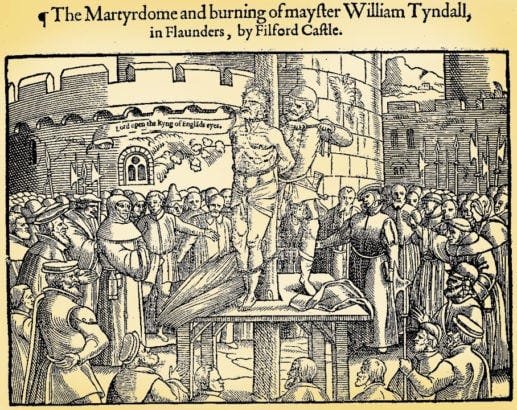Ephesians 6
On this day in 1536 William Tyndale was strangled and burned at the stake. The crime? Translating the Bible into common English, so that the ordinary man could read it for himself. This was against the law at the time.
Today we take for granted that we have Bibles translated into our own language, and in a readable one at that. But this heritage was passed down to us not first in ink but in blood. In those days most villages had one Bible, and it was chained to the pulpit in church. Moreover, it was written in Latin. It took men like Tyndale, ambitious in his faith and courageous in love to men, to change that. At one dinner, when a companion poo-pooed Tyndale’s work, he replied that when he was finished, even the ploy-boy in the field would be reading the Word.
And for that, Tyndale’s last words, before the executioner’s strap wrapped around his neck, was this: “Lord, open the King of England’s eyes.” Years later, when King James commissioned a committee to produce an English Bible, the committee found that it could not improve upon Tyndale’s work, and they simply incorporated it as-is into what became known as the Authorized Version, or the King James Version of the Bible. The King James Version is, in my places, the Tyndale Version.
Today we take certain phrases for granted, but they had to enter the English language from somewhere, and they often come from Tyndale. For instance, the word “scapegoat,” to denote the goat that would carry Israel’s sins into the wilderness (Leviticus 16)? Tyndale invented that word. And in many places, he was masterful at matching the cadence of the ancient Hebrew to (for him) modern English.
All of this gives greater meaning and context to Paul’s request for prayer in Ephesians 6:19-20. Whatever is needed, it happens after prayer. Even the great Paul needed prayer from many unknown others, so that he might complete his course, courageously and usefully. As you read this today, pray for those that you know who wrestle against “the rulers, against the authorities, against the cosmic powers over this present darkness, against the spiritual forces of evil in the heavenly places” (12).
When we leave the doors of the church, demonic forces await. And yet, against the power of Christ in us, not even the gates of hell will prevail.










